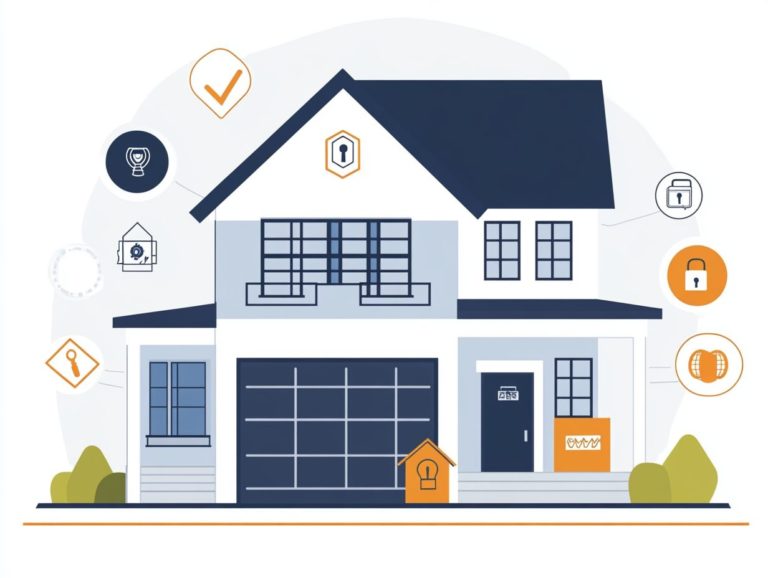What Are Common Home Insurance Questions Answered?
Understanding home insurance can be daunting. Many questions arise regarding coverage, costs, and claims.
This article tackles common concerns, from what home insurance covers to how much coverage you truly need. It distinguishes between homeowners and renters insurance, explores available discounts, and clarifies the claims process.
Whether you own or rent a home, this guide empowers you with the knowledge to make informed decisions about your insurance needs.
Contents
- Key Takeaways:
- 1. What Does Home Insurance Cover?
- 2. Do I Need Home Insurance If I Own My Home?
- 3. How Much Home Insurance Do I Need?
- 4. What Factors Affect the Cost of Home Insurance?
- 5. What Is the Difference Between Replacement Cost and Actual Cash Value?
- 6. What Is the Difference Between Homeowners Insurance and Renters Insurance?
- 7. Can I Get Discounts on Home Insurance?
- 8. What Should I Do If I Need to File a Claim?
- 9. How Often Should I Review and Update My Home Insurance Policy?
- 10. Can I Bundle My Home Insurance with Other Policies?
- 11. What Is the Difference Between Named Perils and All-Risk Coverage?
- 12. What Is the Claims Process Like for Home Insurance?
- 13. How Can I Lower My Home Insurance Premiums?
- 14. What Happens If I Have a Home-Based Business?
- 15. Are There Any Exclusions in Home Insurance Policies?
- Frequently Asked Questions
Key Takeaways:

Understanding common questions about home insurance is key for your protection and peace of mind. Factors like home ownership, location, and coverage needs influence the type and amount of insurance required.
Regularly reviewing and updating your policy, understanding coverage types, and bundling policies can save you money while ensuring you are adequately protected.
1. What Does Home Insurance Cover?
Homeowners insurance, or hazard insurance, is essential for safeguarding your property. It protects against damage to your belongings and provides liability coverage for legal fees.
This coverage also shields you from unforeseen costs that may arise due to home repairs or extra living expenses. You can enjoy financial peace of mind with a policy tailored to your needs.
Your policy typically covers four key areas:
- Structural coverage: This protects your home and attached structures from damage caused by events like fire, wind, or vandalism.
- Personal property protection: This covers your belongings inside the home, including furniture, electronics, and clothing.
- Liability coverage: This pays for legal costs if someone gets injured on your property.
- Additional living expenses: This helps cover temporary housing costs if your home becomes uninhabitable.
Understanding your coverage limits is crucial. This amount determines the maximum payout for a claim.
It’s also vital to be aware of policy exclusions, such as flood or earthquake damage, to ensure you’re prepared for all potential risks.
2. Do I Need Home Insurance If I Own My Home?
Owning a home makes homeowners insurance not just wise but often necessary due to mortgage lenders. This coverage protects you against unexpected liabilities and property damage.
From the lender’s viewpoint, insurance secures their investment in your property. If you face unexpected events natural disasters, theft, or liability claims this insurance covers repair costs or medical expenses.
Without insurance, you risk financial ruin, jeopardizing your ability to meet mortgage obligations. The consequences go beyond property damage; liability coverage protects you from expensive lawsuits for accidents on your property.
This highlights the critical importance of having adequate insurance.
3. How Much Home Insurance Do I Need?
Determining how much homeowners insurance you need involves evaluating your home s value and understanding coverage limits. You must ensure your policy offers robust financial protection for your property and belongings.
Several factors come into play during this assessment. Local rebuilding costs can vary based on market trends. Also, consider the age and condition of your home, as well as potential liabilities like injuries occurring on your property that might lead to medical or legal expenses.
Inadequate coverage risks your financial stability, leaving you vulnerable to unexpected events. Securing comprehensive coverage is essential to avoid complications during stressful situations.
4. What Factors Affect the Cost of Home Insurance?
The cost of homeowners insurance is influenced by various factors, such as your claims history, the deductible you select, eligibility for discounts, and the specific types of coverage relevant to your location, like flood and hazard insurance.
Each of these elements plays an important role in determining your overall premium. For example, if you have a history of frequent claims, insurers may deem you a higher risk. This can lead to increased premiums.
Conversely, opting for a higher deductible might lower your monthly costs. However, be mindful it also means you’ll shoulder more financial responsibility in the event of a claim.
You can reduce costs by taking advantage of discounts, such as bundling policies or installing a security system. By understanding these nuances, you can give yourself the power to make informed decisions that strike the perfect balance between comprehensive coverage and affordability.
5. What Is the Difference Between Replacement Cost and Actual Cash Value?

Understanding the difference between replacement cost and actual cash value is essential for anyone navigating homeowners insurance. This distinction directly influences how your insurance policy compensates you for property damage.
With replacement cost, you receive the full amount needed to replace an item. In contrast, actual cash value takes depreciation, or loss of value over time, into account.
Consider this scenario: if you suffer a devastating fire and own a television valued at $800, a replacement cost policy would grant you the entire $800 for purchasing a new TV. This offers you financial peace of mind and minimizes your out-of-pocket expenses.
However, if you have an actual cash value policy, you might only receive a payout based on the depreciated value of that TV, which could be around $400. This leaves you to foot the bill for the remaining $400.
Recognizing these differences not only gives you the power to choose the right insurance coverage but also underscores the importance of proper valuation methods in protecting your financial interests when a claim arises.
6. What Is the Difference Between Homeowners Insurance and Renters Insurance?
While both homeowners insurance and renters insurance provide essential protection, they differ significantly in the scope of their coverage.
Homeowners insurance offers robust structural protection and liability coverage for property owners, while renters insurance focuses primarily on safeguarding your personal property and providing liability coverage for tenants.
Homeowners insurance typically covers damages caused by fire, storms, and theft. It encompasses the dwelling itself and any attached structures, like garages. Additionally, it protects you against legal liability if accidents occur on your property. To better understand this coverage, you might want to explore what home insurance is. For example, if a guest injures themselves while visiting, your homeowners insurance can help cover their medical expenses.
Renters insurance is specifically designed for individuals who lease their living space. It provides critical protection for personal belongings, such as electronics and furniture, against loss or damage. This coverage is especially important in situations like apartment living, where you need to shield your possessions from theft or accidental disasters, ensuring you have peace of mind in your rented space.
7. Can I Get Discounts on Home Insurance?
Discovering discounts on your home insurance can unlock huge savings! Homeowners insurance policies often come with a variety of discounts that can significantly reduce your premium.
You might qualify for these savings based on factors like a strong claims history, opting for higher deductibles, or even investing in home repairs and safety features.
Beyond these common options, you can also take advantage of multi-policy discounts by bundling your homeowners coverage with auto or life insurance. Installing safety upgrades, such as burglar alarms or fire suppression systems, can lead to even more savings.
Keeping a claim-free record is key; many insurers reward policyholders who’ve avoided claims in recent years with lower rates. It s essential for you to proactively engage with your insurance agent to uncover all available discounts, ensuring you maximize your potential savings and secure the best coverage tailored to your unique needs.
8. What Should I Do If I Need to File a Claim?
If you find yourself in the unfortunate position of needing to file a claim with your homeowners insurance, the first step is to contact your insurance carrier to report the property damage and kickstart the claims process.
This may also involve documenting the damages and understanding any potential legal fees. Before you reach out, gather all relevant information, including your policy number and specifics about the incident.
Proper documentation is invaluable. Take clear photographs of any damage and compile estimates for repairs whenever possible. Once you ve submitted your claim, keep the lines of communication open with the insurance adjuster.
Be ready to answer questions and provide further documentation as needed. This thorough approach not only streamlines your current claim process but also builds a solid claims history, which can significantly influence future policy renewals and coverage options.
9. How Often Should I Review and Update My Home Insurance Policy?
Regularly reviewing and updating your homeowners insurance policy is essential to ensure it reflects changes in your home value, coverage needs, and updates to your claims history that could affect your financial protection.
Aim for a comprehensive review at least once a year. However, significant life events or major home improvements can necessitate an immediate reassessment.
For example, if you decide to undertake substantial renovations or acquire high-value items like art or collectibles, adjusting your policy to maintain adequate coverage is vital.
Changes in personal circumstances, like marriage, divorce, or welcoming children, also introduce new risks and responsibilities that warrant an update to your policy.
By proactively managing these reviews, you greatly enhance your financial security and ensure that you remain well protected.
10. Can I Bundle My Home Insurance with Other Policies?

Bundling your homeowners insurance with other policies can lead to impressive discounts while enhancing your overall financial protection. This strategy allows you to create a comprehensive insurance portfolio that simplifies both payments and renewals.
By consolidating your coverage, you can potentially save on premium costs, as insurers often reward those who choose to bundle. Managing your insurance needs becomes a breeze, allowing you to focus on a single point of contact for any questions or claims.
This not only reduces confusion but also increases efficiency. Common policies that pair well with homeowners insurance include:
- Auto insurance
- Life insurance
This combination reinforces your financial security and opens the door to even greater discounts. Ultimately, bundling saves you money and offers peace of mind, knowing that multiple aspects of your life are adequately covered. Contact your insurance agent today to learn more about bundling!
11. What Is the Difference Between Named Perils and All-Risk Coverage?
In homeowners insurance, understanding the difference between named perils and all-risk coverage is essential. Named perils specifically list the risks covered, while all-risk coverage offers broader protection against a wide range of potential property damage incidents, unless explicitly excluded in your policy.
For example, named peril coverage may include specific threats like fire, theft, or vandalism, clearly outlining what is protected. This level of specificity provides peace of mind, allowing you to feel secure in knowing exactly what is covered. However, it can also leave you vulnerable if an unforeseen event occurs.
On the other hand, all-risk policies encompass many risks, including natural disasters such as storms or floods, creating an extensive safety net. It s crucial to remain vigilant about potential exclusions that may apply, as these can lead to unexpected gaps in your coverage.
Understanding these differences is vital for making informed decisions that ensure adequate financial protection and a smoother claims process when emergencies arise.
12. What Is the Claims Process Like for Home Insurance?
The claims process for home insurance involves several crucial steps designed to help you manage property damage claims efficiently.
It begins with reporting the incident to your insurance carrier and documenting the damages accurately to secure your financial protection.
After notifying the insurance company, gather evidence such as photographs, receipts, and detailed descriptions of the damage. This documentation strengthens your claim and paves the way for smoother communication with the assigned claims adjuster.
Once the adjuster reviews the findings, they will assess the damages and provide you with an estimate for repairs. During this phase, keep open lines of communication with your insurance provider to clarify any uncertainties that may arise.
Be mindful of common pitfalls. Failing to keep copies of all correspondence can cause delays. Neglecting to follow up regularly may complicate your claim resolution process.
13. How Can I Lower My Home Insurance Premiums?
Lowering your home insurance premiums is achievable through strategic approaches. Consider increasing your deductible, making essential home repairs to minimize risk, and seeking available insurance discounts tailored to your circumstances.
Regular maintenance tasks are beneficial. Ensuring that your roof and gutters are in excellent condition can prevent damage-related claims, benefiting both your home and wallet.
Conduct a thorough risk assessment of your property to identify potential hazards. Address them promptly to further reduce risks.
Periodically review and adjust your insurance policy in consultation with your insurance carrier. This can provide customized advice that fits your evolving needs and reflects local market trends. Taking these steps makes your home safer and helps lower your insurance costs.
14. What Happens If I Have a Home-Based Business?
If you re running a home-based business, recognize that your home insurance might not fully cover your business activities. You may need extra liability coverage. A separate policy could also be beneficial for your business.
Many standard homeowners policies include exclusions for business-related incidents. This can leave you exposed when filing a claim. Equipment used exclusively for your business might not be covered, and liabilities arising from client visits can present significant risks.
Assessing these potential coverage gaps highlights the necessity of specialized business insurance designed to address the unique aspects of operating a business from home. This proactive approach not only protects your personal assets but also brings you peace of mind, ensuring that every facet of your home-based venture is well protected.
15. Are There Any Exclusions in Home Insurance Policies?

Understanding the exclusions in home insurance policies is important for you as a homeowner. These exclusions can significantly limit your coverage for events like floods, earthquakes, and certain liability issues that may need extra coverage options.
You might assume that a basic policy covers all your needs, but that s often not the case. Many policies leave out damage from specific natural disasters and may also limit or exclude coverage for personal property, along with certain liability claims, especially those related to home-based businesses.
To avoid unexpected financial burdens during a crisis, thoroughly review these exclusions and understand your potential vulnerabilities. Considering extra coverage options can provide essential coverage for high-value items or specific risks, giving you peace of mind when protecting your valuable assets.
Frequently Asked Questions
What Are Common Home Insurance Questions Answered?
Some common home insurance questions include what type of coverage is included in a home insurance policy, how much coverage is necessary, and what are common misconceptions about home insurance regarding which events the policy covers.
What type of coverage is included in a home insurance policy?
A typical home insurance policy includes coverage for the structure of your home.
It also protects personal belongings, provides liability coverage, and covers extra costs if you have to live elsewhere.
How much coverage is needed?
The needed coverage varies based on your home’s value and the cost to replace your belongings.
Also, think about how much liability coverage you want.
What events are covered under the policy?
Most policies cover damage from fire, theft, vandalism, and natural disasters like hurricanes or earthquakes.
Always check your policy to see what events it covers!
What is not covered under a home insurance policy?
Home insurance usually excludes damages from floods, earthquakes, normal wear and tear, or intentional damage.
Read your policy closely and consider extra coverage for these events.
Can I make changes to my policy?
Yes! You can update your policy whenever you need to by contacting your insurance provider.
This includes adding or removing coverage, updating personal information, or changing coverage limits.






